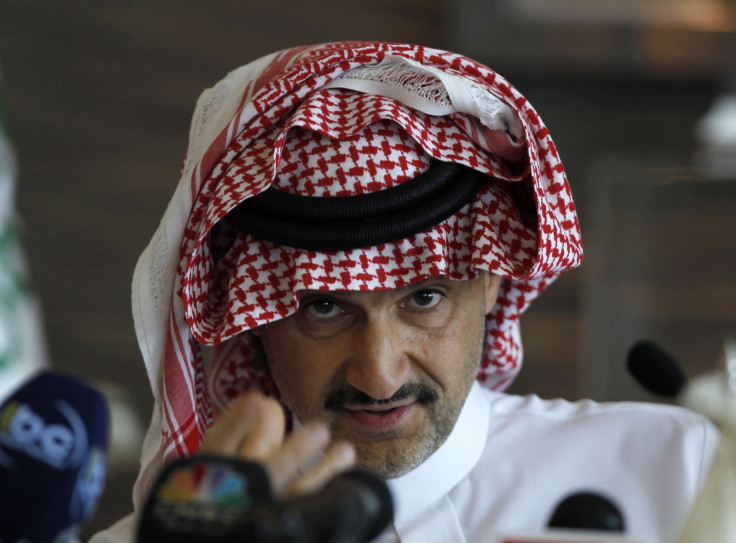What does the 'Arabian Warren Buffett' Prince Alwaleed Bin Talal own?
The Saudi prince's holdings extend from London's Savoy Hotel to Rupert Murdoch's NewsCorp.

Prince Alwaleed bin Talal rose from relative obscurity during the 1990s and established himself as the richest Arab in the world. Hailing from the Saudi royal family, Alwaleed is the nephew of the late King Abdullah.
The prince holds a diverse set of key investments that span across the globe. Through his private pursuits and the Kingdom Holding Company, in which he owns a 95% stake, some of bin Talal's stake holdings include the George V in Paris, the Savoy in London, and the Plaza hotel in New York.
At a glance
- Name: Prince Alwaleed Bin Talal Bin Abdulaziz Al Saud
- Age: 62
- Net Worth: $18.9bn
- Marital Status: Divorced (Married four times)
- Listed as the 45<sup>th richest man on Forbes and ranked 44<sup>th on the Bloomberg Billionaires Index
- Holds a Bachelor's degree from Menlo College and a Master's degree from Syracuse University
- Maintains a close relationship with media baron Rupert Murdoch, and owns a stake in NewsCorp
- Intends to upend Dubai's Burj Khalifa's status as the world's tallest tower with the construction of the Jeddah tower
'Modest beginnings'
Prince Alwaleed bin Talal was born in Jeddah, Saudi Arabia to Talal bin Abdul Aziz and Mona El-Solh. His mother Mona was the daughter of Riad El-Solh, the first prime minister of independent Lebanon.
Prominent publications such as Vanity Fair and The Economist have expressed doubts over the prince's claim to prominence. Alwaleed has claimed that he first attempted his business ventures through two consecutive loans from his father worth $30,000 (£23,085) and $300,000 respectively. However, after the loans failed to yield any results, Talal bin Abdul Aziz decided to give his son the deed to a house instead.
Alwaleed managed to get a mortgage worth $600,000 from the house. He also sold a necklace worth $200,000 that belonged to his first wife, Dalal bint Saud. He pooled the resources together, along with his monthly royal stipend of $15,000, and began his business ventures.
The Economist did not buy the story of Alwaleed's modest beginnings. In a 1999 piece, the publication argued that his investment returns and large risk appetite simply did not add up to his sizeable net worth. Moreover, Saudi Arabia's property laws obfuscate the total values of his real estate holdings in the nation.
From obscurity to media darling
Alwaleed rose to prominence after bailing out an ailing Citigroup towards the end of 1990. He purchased 4.9% of the firm's existing common shares for $12.46 a share, amounting to a total of $207m. He eventually increased his stake to 14.9%.
Alwaleed appears to prefer owning a stake in luxury hotel brands. He purchased a 43% stake in the New York based Plaza Hotel in 1995, followed by a $324m acquisition of the Savoy in London a decade later. He also owns the George V in Paris, which he purchased for $175m and spent a further $125m on renovations. The prince also holds stakes in The Four Seasons Hotels and Resorts Company and Fairmont Raffles Holdings International.
Alwaleed also has a penchant for investing in high-risk high-growth firms primarily in the technology realm, which is reflected through his stock holdings in Twitter and Lyft. Alwaleed owns 80% stake in Rotana, a behemoth media conglomerate based in the Middle East. Besides, he owns a stake in Rupert Murdoch's NewsCorp, with Murdoch reciprocating through a stake ownership in Rotana.
The prince's substantial income allowed him to lead a jet setting lifestyle, which he was not hesitant to flaunt in front of the media. In 2013, Alwaleed expressed outrage at the alleged miscalculation of his total net worth by Forbes magazine, who calculated his net worth at $20bn. Alwaleed claimed the rich list published for the year undervalued him by $9.6bn.
Philanthropy
Prince Alwaleed runs a sizeable charity venture through Alwaleed Philanthropies. The charitable entity endeavours to develop communities primarily in the Middle East, empower women and youth, aid in disaster relief, and enhance intercultural engagement. He has donated $100m for the setup of seven Islamic study centres around the world, including an institution in Harvard University. The establishment of the Islamic centres was undertaken with a view to foster a better understanding of Islam.
The prince has also been a strong advocate of women's rights in a kingdom where women are forbidden to drive or vote. About 65% of his firm's workforce consists of women, and he actively encourages them to forego wearing the veil in his offices. He has also appointed the first Saudi female pilot to fly one of his jets.
© Copyright IBTimes 2024. All rights reserved.





